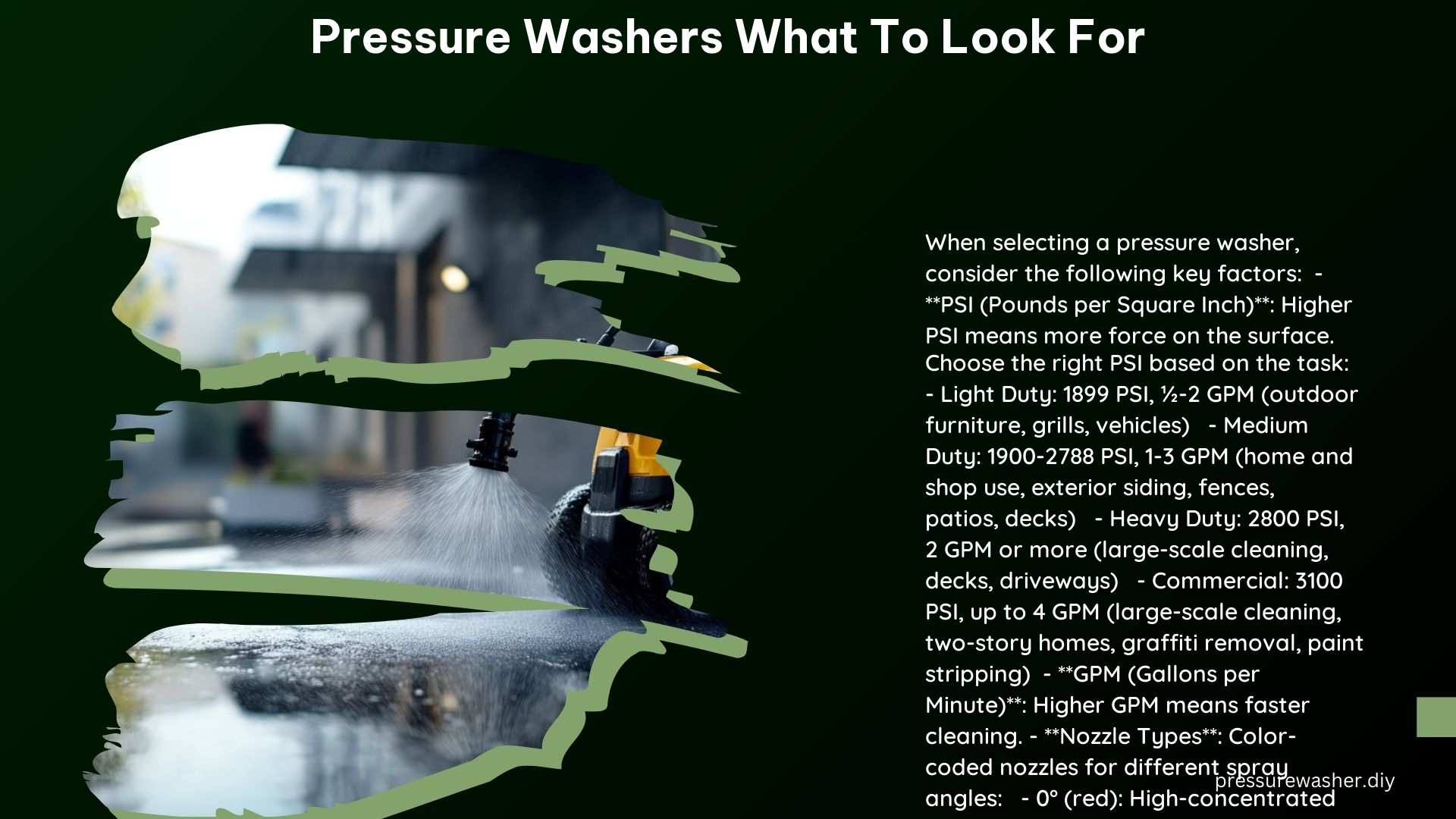When shopping for a pressure washer, it’s crucial to consider several key features to ensure you choose the right one for your specific cleaning needs. This comprehensive guide will delve into the essential details you should look for when selecting a pressure washer, providing you with a detailed playbook to make an informed decision.
Pressure Output (PSI)
The pressure output, measured in pounds per square inch (PSI), is a crucial factor in determining the cleaning power of a pressure washer. Higher PSI means more cleaning power, and the right PSI will depend on the type of cleaning tasks you’ll be tackling.
- Light-duty: 1899 PSI and ½ – 2 GPM (for small jobs like cleaning furniture and vehicles)
- Medium-duty: 1900 – 2788 PSI and 1-3 GPM (for home and shop use, cleaning siding, fences, patios, and decks)
- Heavy-duty: 2800 PSI at 2 GPM or more (for large-scale cleaning jobs, including decks and driveways)
- Commercial: 3100 PSI and up to 4 GPM (for heavy-duty jobs like removing graffiti and stripping paint)
It’s important to note that higher PSI doesn’t always mean better performance. The optimal PSI will depend on the specific cleaning task, and using a pressure washer with too much power can potentially damage delicate surfaces.
Water Volume (GPM)

The water volume, measured in gallons per minute (GPM), determines the flow rate of the water. Higher GPM means faster cleaning, as more water is being delivered to the surface.
- Light-duty: ½ – 2 GPM
- Medium-duty: 1-3 GPM
- Heavy-duty: 2 GPM or more
- Commercial: up to 4 GPM
The ideal GPM will depend on the size of the area you need to clean and the type of cleaning task. For larger jobs or faster cleaning, a higher GPM is generally preferred.
Power Source
Pressure washers can be powered by either gas or electricity, each with its own advantages and disadvantages.
Gas Pressure Washers
- Pros: Powerful, cord-free, and suitable for large jobs.
- Cons: Require more maintenance, need gas, and can be more expensive.
Electric Pressure Washers
- Pros: Quieter, more eco-friendly, and lower maintenance.
- Cons: Less powerful and may have limited mobility due to cord length.
When choosing between gas and electric, consider the size and frequency of your cleaning tasks, as well as the available power sources in your work area.
Nozzles
Pressure washers typically come with a set of interchangeable nozzles, each designed for specific cleaning tasks. These nozzles are often referred to as “universal nozzles” and include the following:
- 0 degrees (red): High-concentrated pressure for heavy-duty jobs.
- 15 degrees (yellow): Intense moderate to heavy-duty cleaning.
- 25 degrees (green): General light-duty tasks.
- 40 degrees (white): Light-duty tasks on easily damaged surfaces.
- 65 degrees (black): Low-pressure nozzle for applying soap and cleaning agents.
Using the correct nozzle for the job is crucial to avoid damage to the surface and ensure effective cleaning.
Additional Features
Pressure washers may come with various additional features that can enhance their functionality and convenience:
- Soap Tank: Allows for easy use of cleaning agents and detergents.
- Tool and Cord Storage: Provides convenient storage for accessories and the power cord.
- Wheels: Improves mobility, especially for heavier models.
These features can make your pressure washing experience more efficient and user-friendly.
Safety Considerations
When using a pressure washer, it’s essential to prioritize safety to prevent injury and damage to the surrounding area.
Hearing Protection
Pressure washers can be quite noisy, so it’s recommended to wear earplugs or earmuffs to protect your hearing.
Nozzle Safety
Ensure you use the correct nozzle for the job to avoid high-pressure water jets that can cause serious injury.
Maintenance and Storage
Proper maintenance and storage are crucial for the longevity of your pressure washer.
Upkeep
Regularly maintain your pressure washer by following the manufacturer’s instructions, including cleaning the nozzles, checking the oil levels, and performing any necessary repairs.
Storage
Consider the storage space needed for the pressure washer unit and its accessories, such as the hose, wand, and nozzles.
Renting vs. Buying
Depending on your cleaning needs, you may consider renting or buying a pressure washer.
Renting
Renting a pressure washer may be a suitable option if you have occasional or specialized cleaning tasks, such as hot-water pressure washing.
Buying
Purchasing a pressure washer can be cost-effective if you plan to use it frequently (three or more times per year) for your cleaning needs.
By considering these factors, you can make an informed decision and choose the right pressure washer that will meet your specific cleaning requirements while ensuring safe and effective use.
References:
1. https://www.consumerreports.org/home-garden/pressure-washers/buying-guide/
2. https://www.pressurewashersdirect.com/stories/343-How-to-Pick-the-Perfect-Pressure-Washer.html
3. https://www.grainger.com/know-how/equipment/kh-choose-pressure-washer
4. https://www.homedepot.com/c/ab/pressure-washer-buying-guide/9ba683603be9fa5395fab90befdde0a
5. https://www.lowes.com/n/buying-guide/pressure-washer-buying-guide
